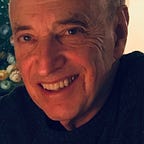The Grandfather Paradox:
Why Changing the Past Will Not Alter the Future
I’ve always been fascinated by the idea of time travel, especially the possibility of using my knowledge of the present to change past lives or historical events. By travelling back in time, I could warn the U.S. government about the plot to bring down the Twin Towers. Or journey even further back to prevent Hitler from creating the Nazi Party and starting World War II.
On a more personal note, I could give my parents stock tips that would make them rich. I might even go back to 1958 and retake the electricity and magnetism final that I failed. There are so many things I would change in my past if I had the opportunity.
The problem is that science tells us that even if we could go back and change the past, the changes we make would not alter the present.
The Grandfather Paradox
We don’t yet have a viable method of travelling to the past, but that has not stopped people from considering this question: If you go back in time and change the past, would that change the present?
This question is usually referred to as the “grandfather paradox.” You travel to the past and either kill your grandfather or prevent him from marrying your grandmother. This precludes your mother from being born. But if that happens, will you still exist in the present?
In the movie Back to the Future, Michael J. Fox, playing a teenager named Marty McFly, inadvertently interferes with his parents meeting and falling in love. As the plot progresses, their romance is faltering and a photo of himself begins to fade. Marty believes that if they do not marry, he will not be born. After a considerable amount of effort, he makes sure that his parents do marry and have him as their son. Is this result consistent with how we understand the laws of physics?
The Many Concepts of Time
In 2009, physicist Stephen Hawking threw a party at the University of Cambridge. Everyone was invited but no one showed up. Hawking had expected as much, because he only sent out invitations after his party had concluded. It was, he said, “a welcome reception for future time travelers,” a tongue-in-cheek experiment to reinforce his conjecture that travel into the past is effectively impossible.
Yet contradictions such as the grandfather paradox don’t mean that time travel is impossible.
The logical consistency of time travel largely depends on your concept of time. The most common perception of time is as a straight line with the present somewhere in the middle. The past stretches back in one direction while the future unfolds in the other.
Physicists conceptualize time differently. Some view it as a loop, others as a circle, an hourglass, or a mobius strip.
Our everyday experience tells us that we can make choices that affect the future, but we cannot make choices that affect the past. Even if you accomplished this, current theory maintains that the iron laws of the universe require that whatever you changed in the past would be corrected. Subsequent events would make sure that the world would remain as it was before your journey.
Richard Gott, a physicist at Princeton, believes that it is possible to create a time machine that will take you back to the past. However, those in the future can use the machine only to go back in time to the moment the time machine was created, but not a second before.
The “many worlds interpretation” (MWI) of quantum mechanics, first described by Hugh Everett, proposes that at every moment we face an infinite number of possible tracks. Each track extends from the past to the future. This implies that there are multiple universes, perhaps an infinite number. The many worlds interpretation views time as a multi-branched tree, in which every possible branch occurs. If you travel back in time and kill your grandfather, you would immediately branch into a parallel universe where that did not happen meaning that you would return to a different present in which you still exist.
Most physicists agree that you cannot change the present by going back to the past. The Novikov self-consistency principle is a formal statement of this assertion. If we are able to go back to the past, and make changes, the universe will simply rearrange events so that the present stays the same. For example, if you go back in time and eliminate the COVID-19 pandemic by killing Patient-1, the principle states that you would then become Patient-1 and the pandemic would still occur.
The same holds true in my previous example of the Twin Towers. Even if I could travel back and warn the authorities, they might not listen to me. Or both of the planes might still make it through and hit their target. There are hundreds, perhaps thousands, of other possibilities, none of which I could foresee or control.
Which means that no matter what I did, the Towers would still come down.
